Study in Norway: Top 15 Cheapest Universities in Norway for International Students in 2024
Norway has many great universities that attract students from all over the world. The country’s higher education system offers a high-quality education that prepares students for successful careers in various fields. However, studying abroad can be expensive, especially for international students. That’s why we’ve put together this list of the cheapest universities in Norway for international students in 2024.
By choosing one of these universities, you can pursue your academic goals and gain new experiences without breaking the bank. These universities offer a wide range of programs and courses that cater to the diverse needs of students. So, if you’re looking for affordable opportunities to study in Norway, read on to find out more about the cheapest universities in Norway for international students in 2024.
Why consider studying in Norway as an international student

Norway, with its stunning landscapes, rich cultural heritage, and high-quality education system, has become an increasingly popular destination for international students seeking affordable opportunities. If you are considering studying abroad, Norway should definitely be on your radar.
One of the key reasons to consider studying in Norway is the emphasis on higher education and research. Norwegian universities are known for their academic excellence and innovative teaching methods. They offer a wide range of programs across various disciplines, ensuring that students have ample opportunities to pursue their interests and career goals.
Moreover, Norway is renowned for its inclusive and egalitarian society, which extends to its education system. International students are welcomed with open arms and are provided with a supportive and inclusive learning environment. This not only enhances the overall learning experience but also contributes to personal growth and cultural exchange.
Another advantage of studying in Norway is the potential cost savings. While many countries charge exorbitant tuition fees for international students, Norway offers a range of affordable options. In fact, some universities in Norway are known to have significantly lower tuition fees compared to other popular study destinations. This makes Norway an attractive choice for students looking for quality education without breaking the bank.
Additionally, Norway’s strong economy and high standard of living provide students with a plethora of opportunities for part-time work and internships, enabling them to gain valuable practical experience while studying. This can be particularly beneficial for international students who wish to enhance their employability and explore career prospects in Norway or elsewhere.
In conclusion, studying in Norway as an international student can be a rewarding and cost-effective choice. From its exceptional education system to its welcoming society and potential for career growth, Norway offers a wealth of opportunities. So, if you are seeking an affordable yet high-quality education abroad, Norway should be on the top of your list.
The benefits of studying in Norway
Studying in Norway offers a multitude of benefits for international students, making it an attractive destination for those seeking quality education at an affordable cost. Here are some of the compelling advantages of studying in Norway:
- High-Quality Education System: Norway is globally recognized for its exceptional education system. Its universities and colleges consistently rank among the top institutions worldwide, ensuring that students receive a high-quality education that is recognized and respected internationally.
- English-Taught Programs: One of the significant advantages for international students is the availability of a wide range of English-taught programs. This eliminates language barriers and allows students from various backgrounds to pursue their desired fields of study without the need for extensive language proficiency in Norwegian.
- Tuition-Free or Low Tuition Fees: Norway is renowned for offering tuition-free education to both domestic and international students at public universities. While some specialized programs may have tuition fees, they are significantly lower compared to many other countries. This makes studying in Norway an affordable option for students seeking quality education without the burden of high tuition costs.
- Safe and Inclusive Environment: Norway is known for its safe and inclusive society, making it an ideal place for international students to pursue their education. The country values equality, diversity, and tolerance, ensuring that students from all backgrounds feel welcome and respected.
- Stunning Natural Beauty: Apart from its educational offerings, Norway is famous for its breathtaking natural landscapes, including fjords, mountains, and the mesmerizing Northern Lights. Studying in Norway provides students with opportunities to explore and immerse themselves in the country’s unique and awe-inspiring natural beauty.
- Strong Focus on Research and Innovation: Norway is at the forefront of cutting-edge research and innovation. Students have access to state-of-the-art facilities, laboratories, and research opportunities, enabling them to engage in groundbreaking research and contribute to various fields of study.
- High Standard of Living: Despite its reputation as an expensive country, Norway also offers a high standard of living. The quality of life, social welfare system, and access to various services and amenities contribute to a comfortable and fulfilling student life experience.
By choosing to study in Norway, international students can benefit from a combination of affordable education, exceptional academic standards, a welcoming environment, and unparalleled natural beauty. It is an opportunity to experience a culturally rich and academically rewarding journey that will undoubtedly leave a lasting impression.
Understanding the cost of education in Norway
Norway, known for its stunning landscapes and high quality of education, has become an increasingly popular destination for international students seeking affordable opportunities. However, before making the decision to pursue higher education in Norway, it is crucial to understand the cost associated with it.
Tuition fees in Norway can vary depending on the university and the program of study. The good news is that many universities in Norway offer tuition-free education for both domestic and international students. This means that you can study at some of the top institutions in the country without having to worry about hefty tuition bills.
While tuition might be free at public universities, it is important to note that there are still some costs that international students need to consider. One of the main expenses is the cost of living. Norway is known for its high standard of living, which also translates into higher living expenses. Accommodation, food, transportation, and other daily expenses can add up, so it is essential to plan your budget accordingly.
To mitigate some of these costs, international students can explore various options such as scholarships, part-time jobs, or student housing. Scholarships are available for international students in Norway, and they can significantly reduce the financial burden. Additionally, part-time jobs can help cover some of the living expenses while also providing valuable work experience.
It is also worth mentioning that Norway offers a high standard of healthcare and social welfare, which is included in the taxes paid by residents. International students usually have access to these services as well, ensuring their well-being and safety throughout their time in Norway.
Understanding the cost of education in Norway is a crucial step in planning your academic journey. By considering both the tuition fees and the cost of living, you can make informed decisions and find affordable opportunities that align with your budget. Norway’s commitment to providing accessible education for international students makes it an attractive destination for those seeking quality education without breaking the bank.
Factors to consider when choosing an affordable university in Norway
When considering studying abroad, Norway may not be the first destination that comes to mind. However, with its exceptional education system and stunning landscapes, it is becoming an increasingly popular choice for international students. One of the key factors that draws students to Norway is its affordability. In this section, we will explore the factors that you should consider when choosing an affordable university in Norway.
- TUITION FEES: The first and most obvious factor to consider is the tuition fees. While Norway is known for its high living costs, many of its universities offer tuition-free education for both domestic and international students. However, it is important to note that some programs and courses may have specific fees, so it is crucial to research and compare the costs of different universities and programs.
- SCHOLARSHIPS AND FINANCIAL AID: Another factor to consider is the availability of scholarships and financial aid. Norway offers various scholarships and grants specifically designed for international students. These opportunities can significantly reduce the financial burden of studying abroad. Research the scholarships and financial aid options offered by different universities to find the best fit for your financial situation.
- LIVING COSTS: Although tuition fees may be low or nonexistent, it is essential to consider the living costs when choosing an affordable university in Norway. Cities like Oslo and Bergen tend to have higher living expenses compared to smaller towns. Choosing a university located in a less expensive area can help you save money on accommodation, food, and daily expenses.
- PART-TIME JOB OPPORTUNITIES: Exploring part-time job opportunities is another crucial factor to consider. While studying in Norway, international students are allowed to work part-time. Having the option to work can help supplement your income and reduce the financial burden. Research the job market and employment opportunities in the city or town where your chosen university is located.
- QUALITY OF EDUCATION: Lastly, while affordability is an important consideration, it is equally important to ensure that the university you choose offers high-quality education. Look into the reputation and rankings of the universities you are interested in. Consider factors such as faculty qualifications, research opportunities, and student support services to ensure that you receive a quality education that aligns with your academic goals.
By considering these factors, you can make an informed decision when choosing an affordable university in Norway. Remember to thoroughly research and compare different universities to find the one that not only fits your budget but also provides an excellent educational experience. Norway’s affordable opportunities await you, so start planning your study abroad journey today.
List of the cheapest universities in Norway for international students in 2024
If you are considering studying in Norway as an international student, it’s important to consider the cost of education. Norway is known for its high standard of education but can also be expensive. However, there are affordable opportunities available for international students. Here is a list of the cheapest universities in Norway for international students in 2024:
| University | Annual Bachelor’s International Tuition | % Cheaper than Average* |
|---|---|---|
| Inland Norway University of Applied Sciences | 0 NOK | 100% |
| MF Norwegian School of Theology, Religion and Society | 0 NOK | 100% |
| NLA University College | 0 NOK | 100% |
| Norwegian University of Life Sciences | 80,000 NOK | -5% |
| Norwegian University of Science and Technology | 0 NOK | 100% |
| Oslo Metropolitan University | 0 NOK | 100% |
| Ostfold University College | 0 NOK | 100% |
| Sámi University of Applied Sciences | 0 NOK | 100% |
| UiT The Arctic University of Norway | 0 NOK | 100% |
| University Centre in Svalbard | 0 NOK | 100% |
| University of Bergen | 0 NOK | 100% |
| University of South-Eastern Norway | 0 NOK | 100% |
| University of Stavanger | 80,000 NOK – 125,000 NOK | -5% |
| VID Specialized University | 5,300 NOK – 6,200 NOK | 94% |
| Volda University College | 0 NOK | 100% |
1. University of South-Eastern Norway

The University of South-Eastern Norway commonly known as USN, is a Norwegian state university. It has campuses in Bø in Telemark, Porsgrunn, Notodden, Rauland, Drammen, Hønefoss, Kongsberg and Horten. USN is a continuation of the three former university colleges, Telemark University College, Buskerud University College and Vestfold University College, which merged between 2014 and 2016 to form the University College of South-Eastern Norway. The institution was granted the status of a full university by the King-in-Council on 4 May 2018.
USN has 88 undergraduate programs, 44 master’s programs and 8 PhD programs. Measured in the number of students, USN is the fourth largest University in Norway with approximately 17,000 students and 1,900 staff, spread over eight campuses. The university is exclusively offering several courses in Norway, such as optician study in Kongsberg.
2. University of Bergen
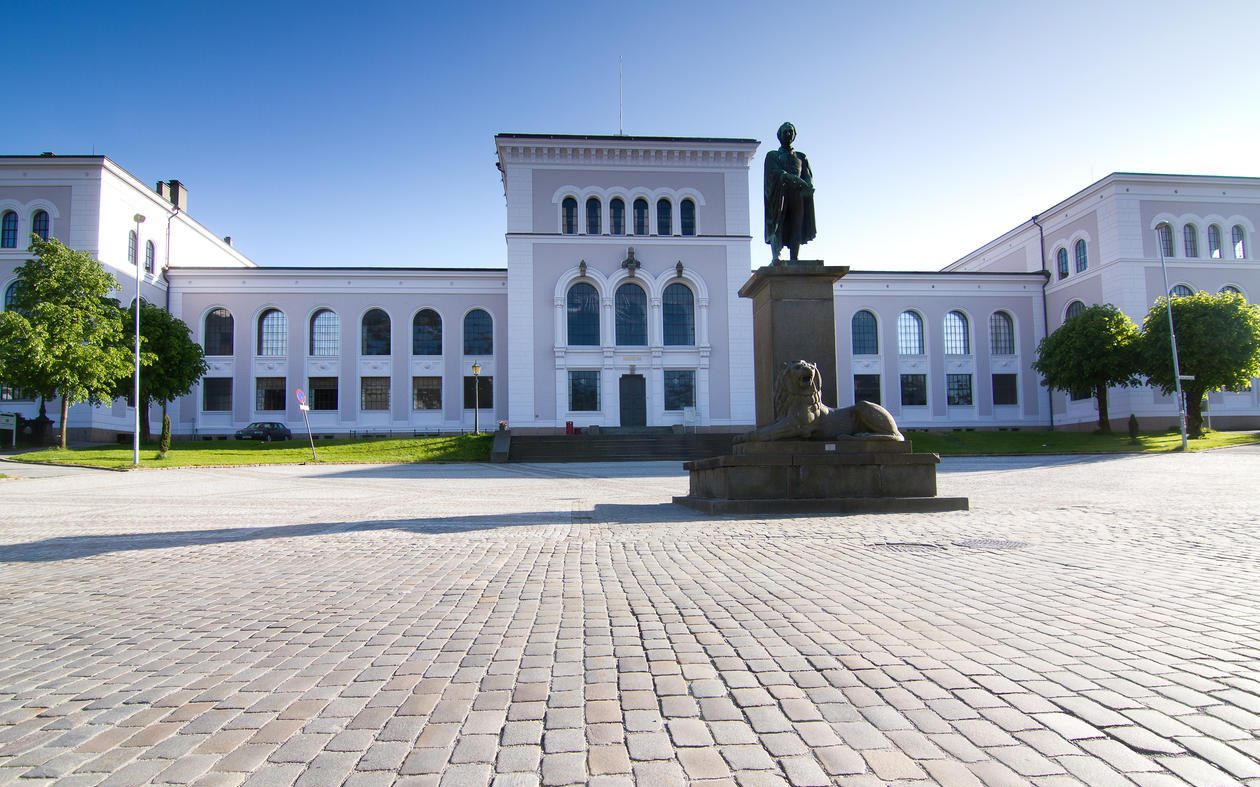
The University of Bergen is a public research university located in Bergen, Norway. As of 2021, the university has over 4,000 employees and 19,000 students. It was established by an act of parliament in 1946 based on several older scientific institutions dating back to 1825, and is Norway’s second-oldest university. It is considered one of Norway’s four “established universities” and has faculties and programmes in all the fields of a classical university including fields that are traditionally reserved by law for established universities, including medicine and law.
It is also one of Norway’s leading universities in many natural sciences, including marine research and climate research. It is consistently ranked in the top one percentage among the world’s universities, usually among the best 200 universities and among the best 10 or 50 universities worldwide in some fields such as earth and marine sciences. It is part of the Coimbra Group and of the U5 group of Norway’s oldest and highest ranked universities.
3. Inland Norway University of Applied Sciences

The Inland Norway University of Applied Science is a state university college in Innlandet, Norway, established in 2017 from the merger of the Hedmark University College and Lillehammer University College. It has six campuses, of which Lillehammer is the biggest, located at the television and radio center built for the 1994 Winter Olympic Games.
The university was formed on 1 January 2017 from the merger of Hedmark University College and Lillehammer University College. The rector is Peer Jacob Svenkerud. The university has campuses in Blæstad, Elverum, Evenstad, Hamar, Lillehammer and Rena. It has faculties spread across all sites, with approximately 16,000 students and 1,100 employees.
4. MF Norwegian School of Theology, Religion and Society

MF Norwegian School of Theology, Religion and Society formerly the Free Faculty of Theology and MF Norwegian School of Theology, is an accredited Norwegian specialized university focused on theology, religion, education and social studies, located in Oslo, Norway. It is one of three private specialized universities in Norway, alongside VID and BI.
MF was founded in 1907 as an independent theological institution at university level and is Norway’s largest provider of theological education and research. MF has around 110 employees, 1300 bachelor and master students and about 60 Ph.D. students.
5. Ostfold University College

Østfold University College (Norwegian: Høgskolen i Østfold, HiØ) is a university college in Viken county, Norway. It has campuses in Fredrikstad and Halden, and has around 7000 students (as of 2017) and 550 employees (as of 2017).
The university college is one of the public university colleges in Norway, and is a result of five public colleges in Halden, Sarpsborg and Fredrikstad which were joined together as a part of the University College Reform (Norwegian: Høgskolereformen) of 1994.
6. NLA University College
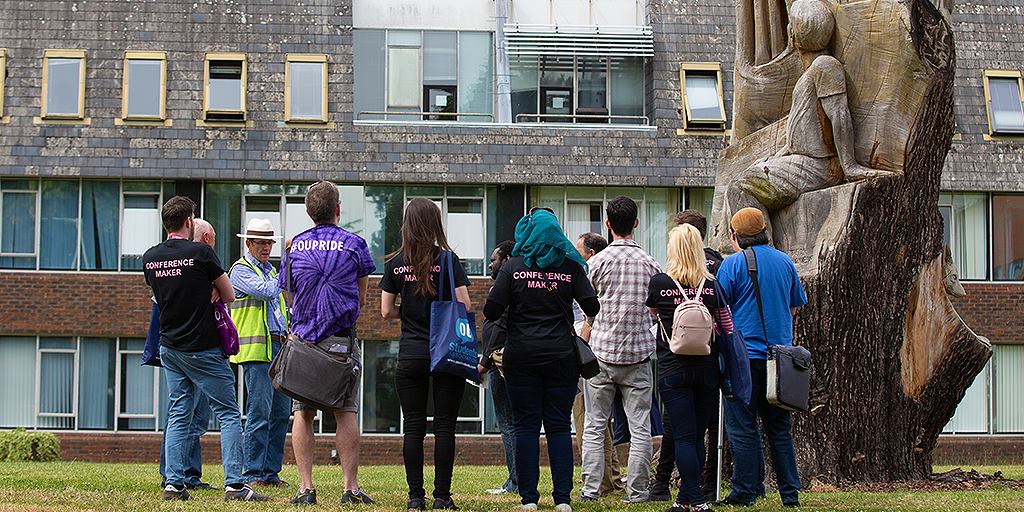
NLA University College is a private Norwegian Christian college accredited by the Norwegian Agency for Quality Assurance in Education. The school has about 2,000 students and 200 employees distributed across three institutions: Bergen NLA College, Gimlekollen NLA College in Kristiansand, and Staffeldtsgate NLA College in Oslo.
The institution in Bergen is the largest and hosts the college’s head office. NLA University College acquired its institutions in Oslo and Kristiansand after the colleges there merged with NLA University College on January 1, 2013.
7. Norwegian University of Science and Technology

The Norwegian University of Science and Technology, shortly referred to as NTNU, is a public university in Trondheim, Norway. It specializes in Engineering and Technology degree programs, along with Arts, Social Sciences, and Architecture. With a history that goes back to 1760, NTNU became one of the largest universities in the country, with its over 40,000 student population.
NTNU was inaugurated by the King-in-Council in 1996 as a result of the merger of the former University of Trondheim and other university-level institutions, with roots dating back to 1760. At a later stage, some former university colleges were also incorporated. Typically, its ranks within the 400–600 range. As of November 2022, the university boasts an approximate 9,000 employees and 42,000 students.
8. Sámi University of Applied Sciences
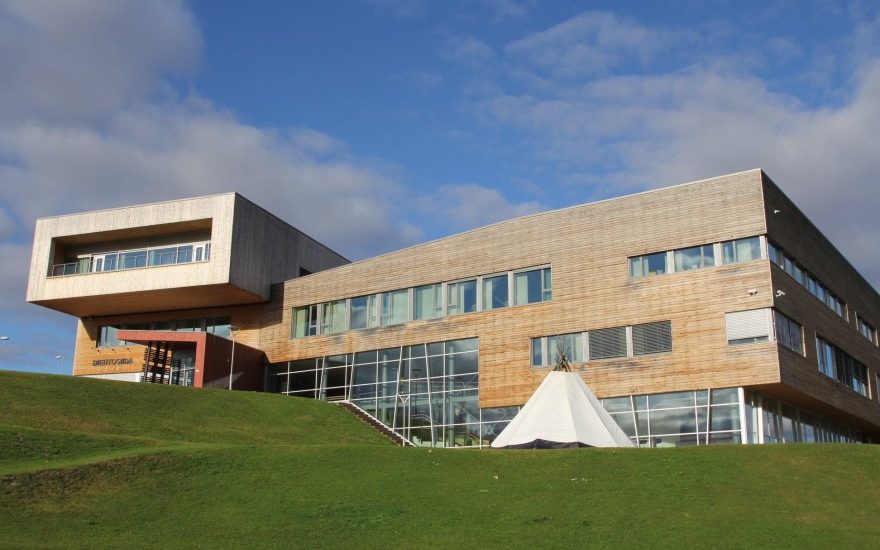
Sámi University of Applied Sciences is a university that is located in the village of Kautokeino in Kautokein Municipality in Finnmark county, Norway. It was established in 1989 and has about 200 students and 110 faculty, technical and administrative staff. It is one of 25 Norwegian state university colleges. Since 2009 it has been located at the campus complex of Diehtosiida.
Sámi University of Applied Sciences is dedicated to the Sámi indigenous people and culture. It is the only one of its kind in the world. The primary language of instruction is Sámi; thus, proficiency in it is required. However, if you’re not that fluent, don’t be discouraged, as you can learn Sámi at the university. Despite its small population, the university delivers a range of programs that focus on indigenous journalism, teaching, Sámi language and literature, social science, and even reindeer herding.
9. Volda University College
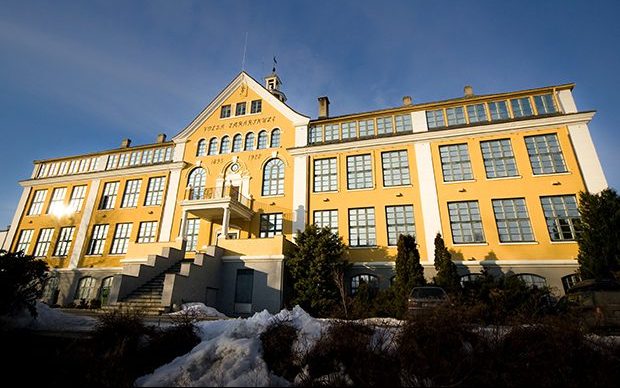
Volda University College is one of the state-supported academic institutions in Norway. It was founded in 1994 through the merger of two colleges in Møre og Romsdal county. HVO has a long tradition in Volda dating back to a teachers’ training college which was first established here in 1895. The current rector is Johann Roppen and it has approximately 4,500 students and 350 employees (2020).
HVO is divided into four faculties: the Faculty of Humanities and Education, the Faculty of Fine and Performing Arts, the Faculty of Social Sciences and History, and the Faculty of Media and Journalism. There are a total of 6 Master’s degree programmes, 30 undergraduate study programmes, and about 300 courses offered.
10. Oslo Metropolitan University
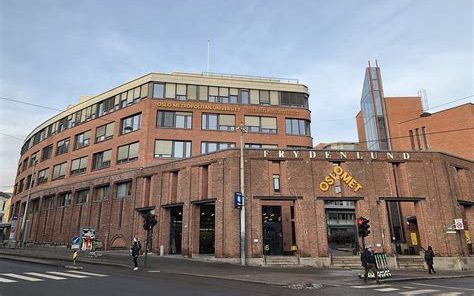
Oslo Metropolitan University was established on 12 January 2018 and is the second youngest of Norway’s new universities. It evolved from what was until 2018 Norway’s largest university college, Oslo and Akershus University College, which was itself the result of many previous mergers of around 30 former vocational colleges and community colleges in the Oslo area.
It is one of the cheapest universities in Norway for international students in 2024. It has more than 21,900 students and around 2,200 employees. The university offers degree programs in Engineering, Computer Science, Technology, Health and Social Sciences. Most of the university is located in the city centre of Oslo along the Pilestredet street, with subsidiary campuses in Kjeller in Viken.
11. UiT The Arctic University of Norway
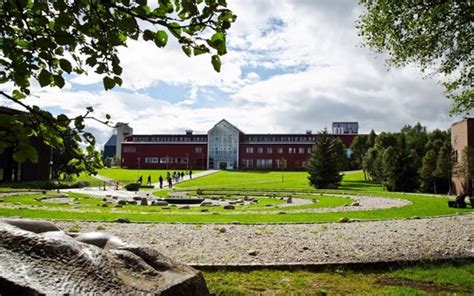
UiT The Arctic University of Norway, a public institution established in 1968, is located in Tromsø. As the world’s northernmost university, its studies are focused on the Arctic, the problems it faces, and its preservation.
Students who take this challenge experience learning amidst an arctic and wild environment. They choose from high-quality courses in the sciences, humanities, technology, economics, etc. The university even offers some English-taught courses.
12. University Centre in Svalbard

The University Centre in Svalbard is a Norwegian state-owned limited company that is involved in research and provides some higher education in Arctic studies. The company is wholly owned by the Ministry of Education and Research, and the universities of Oslo, Bergen, Tromsø, NTNU and NMBU appoint the board of directors. It is led by a director appointed by the board for a four-year term.
The centre is the world’s northernmost research and higher education institution, in Longyearbyen at 78° N latitude. The courses offered fall into five main science disciplines: Arctic biology, Arctic geology, Arctic geophysics, Arctic technology and Arctic safety.
13. VID Specialized University
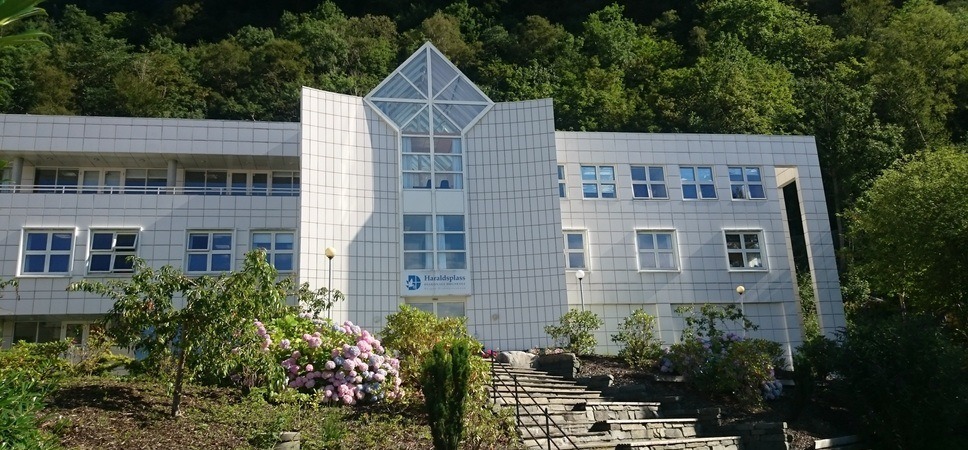
VID is a subsidiary of the foundation Diakonhjemmet, an independent and non profit diaconal institution within the Lutheran state Church of Norway. VID was established in 2016 through a merger of Diakonhjemmet University College with several smaller colleges with a history dating back to 1843. VID Diakonhjemmet, its headquarters and largest campus, is located in Frøen in Oslo next to Diakonhjemmet Hospital, also owned by Diakonhjemmet. The first rector of VID was Ingunn Moser.
VID is one of the cheapest universities in Norway for international students in 2024. It conducts research and offers studies from bachelor’s to doctoral level in health sciences, social sciences, and theology. VID has around 50 study programmes, including three doctoral programmes. It is the largest private PhD-awarding institution in Norway.
14. Norwegian University of Life Sciences
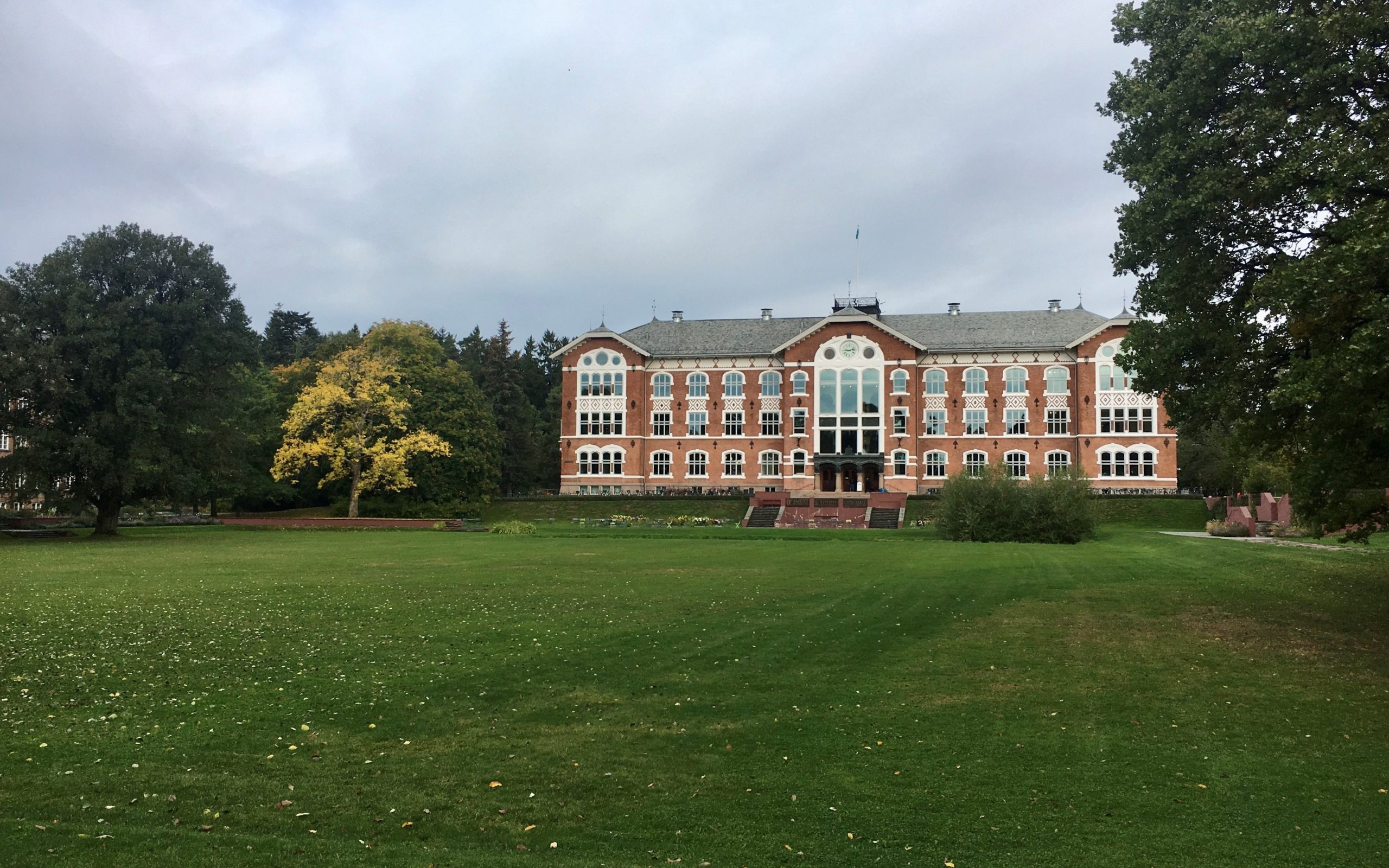
The institution was established in 1859 as the Higher Agricultural College. In 1897 the institution was transformed into the Norwegian College of Agriculture (Norges Landbrugshøiskole, later spelled Norges Landbrukshøiskole, Norges landbrukshøyskole and Norges landbrukshøgskole, abbreviated NLH). It received the status of a university-level college (vitenskapelig høgskole).
In 2005 it received university status and was renamed the Norwegian University of Life Sciences (Universitetet for miljø- og biovitenskap; UMB). In 2014 the it merged with the Norwegian School of Veterinary Science (NVH) in Oslo; it retained its English name but was formally renamed Norges miljø- og biovitenskapelige universitet (NMBU) in Norwegian. It is the only educational institution in Norway to provide veterinary education.
15. University of Stavanger
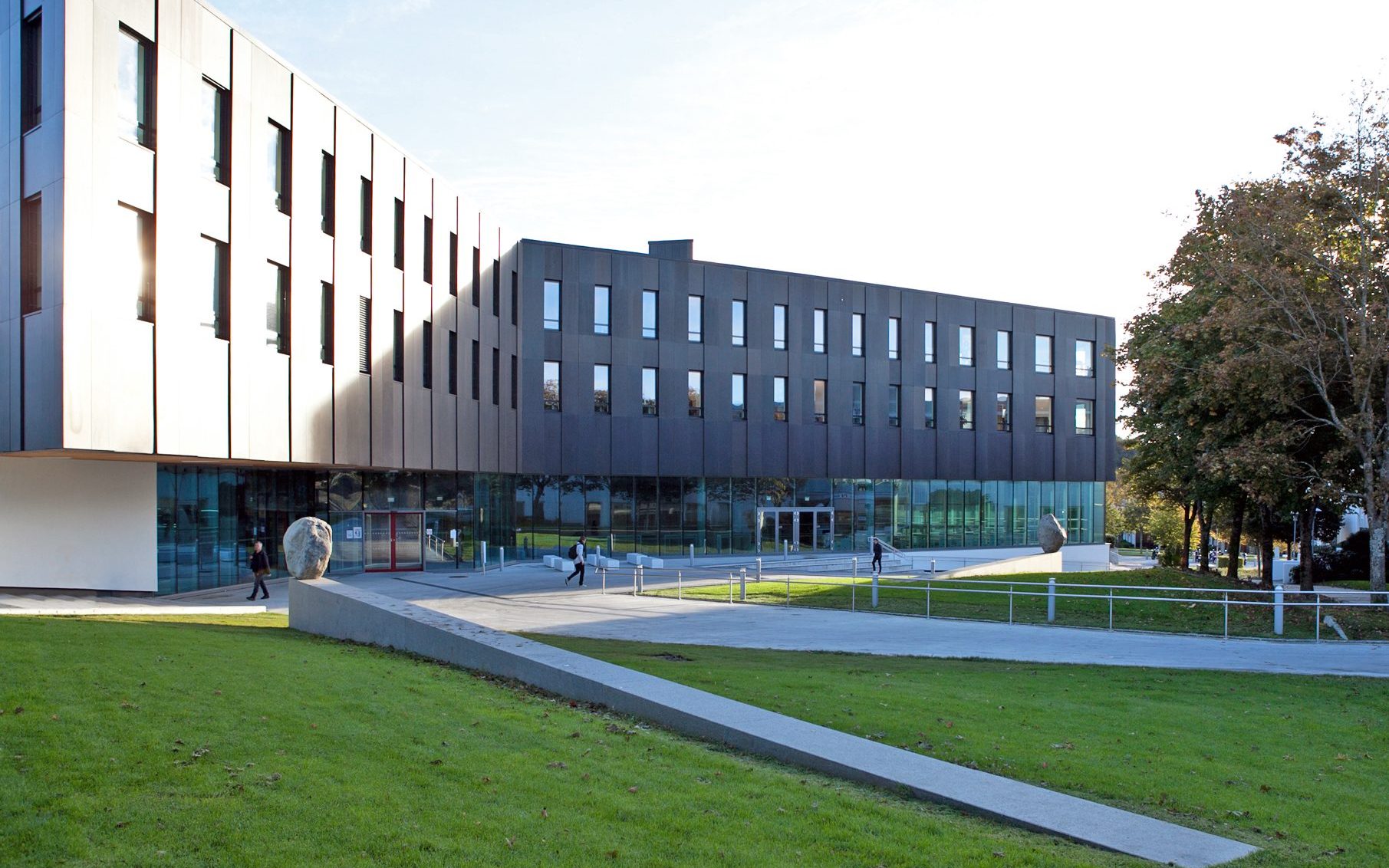
The University of Stavanger is one of the cheapest universities in Norway for international students in 2024. It is one of the public universities in Norway, providing students with tuition-free education. It was founded in 2005 after its predecessor, Stavanger University College achieved a university status. The university is currently home to more than 12,000 students and offers bachelor’s, master’s and Ph.D. degree programs in Arts, Education, Social Sciences, Engineering, and Natural Sciences.
While these universities may be the cheapest options for international students in Norway, it’s important to note that the cost of living and other expenses should also be considered. Scholarships and financial aid options may also be available to help offset the costs. It’s recommended to thoroughly research each university and consider your personal preferences and academic goals before making a decision.
Top 10 easiest scholarships in Norway for international students in 2024
Norway is known for its exceptional education system and welcoming attitude towards international students. If you’re considering studying in Norway and looking for financial assistance, you’ll be delighted to know that there are several scholarships available specifically for international students. In this section, we will explore the top 10 easiest scholarships in Norway for international students in 2024.
- Quota Scheme Scholarship: This scholarship is funded by the Norwegian government and aims to promote internationalization in Norwegian education. It covers full tuition fees and provides a monthly living allowance.
- Erasmus+ Scholarship: This scholarship is offered under the European Union’s Erasmus+ program. It provides financial support for international students studying in Norway as part of an exchange program.
- Norwegian State Educational Loan Fund: Although this is not a traditional scholarship, it offers low-interest loans to international students studying in Norway. The loans are administered by the Norwegian government and have favorable repayment terms.
- University Scholarships: Many universities in Norway offer scholarships exclusively for international students. These scholarships may cover partial or full tuition fees and are awarded based on academic merit.
- The Research Council of Norway Scholarships: This scholarship is targeted towards international students pursuing research-based programs in Norway. It provides financial support for living expenses and research-related costs.
- SIU Norway Scholarships: The Norwegian Centre for International Cooperation in Education (SIU) offers scholarships to international students studying in specific fields such as energy, climate, and environment.
- Peace Scholarships: These scholarships are offered by the Norwegian Students’ and Academics’ International Assistance Fund (SAIH). They support students from developing countries who are pursuing studies related to peace and development.
- Norwegian Partnership Program for Global Academic Cooperation (NORPART): This scholarship aims to enhance collaboration between Norwegian higher education institutions and institutions in developing countries. It supports student mobility and research.
- Norwegian Quota Scholarship Scheme for Developing Countries: This scholarship is specifically for students from developing countries and covers full tuition fees, living expenses, and travel costs.
- Fulbright Grants: While this scholarship is primarily associated with the United States, there are Fulbright grants available for Norwegian and American students to study in each other’s countries. These grants cover various fields of study and promote cultural exchange.
These scholarships present excellent opportunities for international students to pursue their educational goals in Norway. It’s important to carefully review the eligibility criteria, application deadlines, and required documents for each scholarship to increase your chances of success. With determination and thorough research, you can unlock these opportunities and make your study abroad dreams come true in Norway.
Additionally, many universities in Norway have their own scholarship programs specifically designed for international students. These scholarships may be merit-based, focusing on academic excellence, or need-based, considering the student’s financial situation. It is advisable for prospective students to thoroughly research and explore the scholarship options offered by each university they are interested in.
Apart from scholarships, international students in Norway can also benefit from various financial aid options. The Norwegian State Educational Loan Fund (Lånekassen) provides low-interest loans and grants to students, both Norwegian and international, to cover living expenses while studying. This can significantly reduce the financial burden and allow students to focus on their studies without constantly worrying about financial constraints.
Furthermore, it is worth noting that some universities in Norway offer part-time job opportunities for international students. These jobs not only provide additional income but also offer valuable work experience, enhancing the student’s resume and future career prospects.
When considering studying in Norway, international students should thoroughly explore and take advantage of the scholarships, financial aid options, and part-time job opportunities available. With careful planning and research, it is possible to pursue an affordable education in Norway and experience the rich cultural and educational offerings this beautiful country has to offer.
Tips for budgeting and saving money while studying in Norway
Studying in Norway can be an incredible opportunity, but it’s no secret that the cost of living in this beautiful Scandinavian country can be quite high. However, with some careful planning and budgeting, you can make the most of your experience while still saving money. Here are some valuable tips to help you budget and save money while studying in Norway:
- ACCOMMODATION: Look for affordable housing options such as shared apartments or student dormitories. These options are often cheaper than renting your own apartment and can also provide a great opportunity to meet fellow students.
- FOOD AND GROCERIES: Eating out in Norway can be expensive, so try to cook your meals at home as much as possible. Look for budget-friendly grocery stores and plan your meals in advance to avoid unnecessary expenses. Taking advantage of student discounts at local restaurants can also help you save some money when you do decide to eat out.
- TRANSPORTATION: Norway has a well-connected public transportation system, so consider using buses and trains instead of taxis or private cars. Look into student discounts or monthly passes that can help you save on transportation costs. Additionally, consider walking or biking for shorter distances to save even more.
- ENTERTAINMENT AND LEISURE: Norway offers a range of free or low-cost activities for students. Take advantage of student discounts at museums, theaters, and cultural events. Explore the beautiful nature around you by hiking or participating in outdoor activities, which are often free of charge. Joining student organizations or clubs can also provide affordable opportunities for socializing and entertainment.
- SCHOLARSHIPS AND PART-TIME JOBS: Research and apply for scholarships specifically available for international students. These can help offset some of your expenses. Additionally, consider finding part-time work opportunities on or off-campus to earn some extra income. Just make sure to balance your work and study commitments.
- SAVING ON TEXTBOOKS AND STUDY MATERIALS: Instead of buying new textbooks, try to borrow or buy used ones from previous students. Look for online resources or e-books, which are often more affordable or even free. Utilize libraries and study groups to share study materials and resources.
By implementing these tips, you can create a budget-friendly lifestyle while studying in Norway. Remember, it’s all about being mindful of your spending, seeking out cost-saving opportunities, and making the most of the affordable options available to you as an international student.
Other cost-cutting strategies for international students in Norway
While studying abroad in Norway can be an enriching and transformative experience, it’s no secret that it can also be expensive. However, there are several cost-cutting strategies that international students can employ to make their stay more affordable.
One effective strategy is to explore part-time job opportunities. Norway provides international students with the option to work while studying, allowing them to earn an income and cover some of their expenses. Many universities also offer job placement services, making it easier for students to find suitable employment opportunities.
Another cost-saving option is to opt for shared accommodation. Rent prices in Norway can be high, but by sharing an apartment or a student dormitory with other students, you can significantly reduce your housing expenses. Additionally, some universities provide affordable on-campus housing options for international students, which can be a convenient and budget-friendly choice.
Food costs can also be a major expense for students. To save money, consider cooking your meals instead of eating out regularly. Grocery shopping and preparing your own meals can be not only cost-effective but also a great way to experience local cuisine and enhance your culinary skills.
Transportation costs can be minimized by utilizing public transportation options such as buses, trams, and trains. Norway has an extensive and efficient public transportation network, and most cities offer discounted student fares. Consider purchasing a monthly or semester pass to save money on daily commuting.
Lastly, take advantage of student discounts and benefits. Many businesses in Norway offer exclusive discounts for students, ranging from restaurants and cafes to museums and attractions. Always carry your student ID with you and inquire about available discounts wherever you go.
By implementing these cost-cutting strategies, international students in Norway can make their educational journey more affordable and enjoy a fulfilling experience without straining their budgets. Remember, with careful planning and resourcefulness, studying in Norway doesn’t have to break the bank.
Conclusion: Making the most of affordable opportunities in Norway
In conclusion, Norway offers a plethora of affordable opportunities for international students in 2024. The country’s commitment to high-quality education combined with its relatively low tuition fees makes it an attractive choice for those seeking a world-class education without breaking the bank.
By exploring the cheapest universities in Norway, international students can unlock access to top-notch academic programs and diverse cultural experiences. Whether it’s the University of Oslo, the University of Bergen, or any other institution on the list, students can rest assured that they will receive a quality education that is recognized worldwide.
However, it’s important to remember that affordability goes beyond just tuition fees. Living expenses, such as accommodation, food, and transportation, should also be taken into consideration when planning your budget. Norway, known for its higher cost of living, requires careful financial planning to ensure a comfortable and enjoyable student experience.
Additionally, scholarships and grants can provide further financial assistance to international students. It’s crucial to explore scholarship opportunities offered by universities, organizations, and the Norwegian government to help alleviate the financial burden and make the most of the affordable opportunities available.
Lastly, embracing the Norwegian culture and immersing oneself in the local community can enhance the overall experience of studying in Norway. Engaging in extracurricular activities, participating in student organizations, and exploring the stunning natural landscapes will not only enrich your time as a student but also create lifelong memories.
In conclusion, with thorough research, careful financial planning, and an open mind, international students can make the most of the affordable opportunities offered by Norway’s cheapest universities. By choosing to study in Norway, students can embark on an educational journey that combines academic excellence, affordability, and a unique cultural experience.
We hope you found our blog post about the cheapest universities in Norway for international students in 2024 helpful. Pursuing higher education can be expensive, but with the information provided in this article, you can now explore affordable opportunities in Norway. Investing in your education is a significant decision, and we hope this article has shed some light on the possibility of studying in Norway without breaking the bank. Remember to stay updated with the latest information and requirements, and best of luck in your educational journey!








